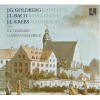Texte paru dans: / Appeared in:

Fanfare Magazine:
Pour
s'abonner / Subscription information
Les abonnés à Fanfare Magazine ont accès aux archives du
magazine sur internet.
Subscribers to Fanfare Magazine have access to the archives of the magazine
on the net.
Ricercar
RIC317

5400439003170 (ID219)
Consultez toutes les évaluations recensées pour ce cd
~~~~ Reach all the evaluations located for this CD
Composing and rehearsing a new cantata for each Sunday of the liturgical year by the Kapellmeistern was generally the accepted norm during the Baroque era, so it was no surprise to Johann Sebastian Bach when he accepted the post of Thomaskantor in Leipzig in May of 1721. As the years wore on, there were times when Bach would repeat his own compositions or even replace them with works of his colleagues or more gifted students that were in his personal library or that of the Thomaskirche. This release affords us a glance at some of that repertoire.
Johann Ludwig Bach (1677–1731), the son of Jakob Bach and Martha Schmidt, is today known as the Meiningen Bach since from 1703 he worked at the Meiningen court. Exactly how much music he composed is uncertain, but we are relatively sure that some of it was destroyed during the firebombing of Dresden by the Allies in World War II. What have survived are 22 cantatas, 12 motets, a Missa Brevis, a large-scale funeral ode, and a single orchestral suite.
If it weren’t for the famous Goldberg Variations composed by Johann Sebastian Bach for Johann Gottleib Goldberg, the latter’s name might remain a mystery. However, Goldberg was not only a highly skilled keyboard player, he was an excellent composer. Stylistically, his music varies from work to work. His keyboard pieces are more galant and in his harpsichord concertos (MDG 601 0250) he writes on a larger scale and makes use of an even more modern and ambitiously chromatic style, but no such adventurism is to be found in the pair of choral works offered here.
Johann Ludwig Krebs (1713–80) would spend most of his career in Leipzig—like a crab in water (Krebs in Bache)—where from his boyhood he studied with Johann Sebastian Bach and emulated him in his compositions even though the Baroque style was becoming passé by the time Krebs reached adulthood. Krebs would never travel far during his career as a virtuoso organist.
The music on this Ricercar release is quite conservative but it is also quite impressive in its language. It is an extremely interesting and at the same time attractive release that augurs well for the composers represented. Florian Heyerick and Ex Tempore of Ghent are perfectly suited to this repertoire, as they have previously shown in their compact disc of motets by Johann Ludwig Bach (Carus 83.187). Their sound is light but never anemic and they are certainly capable of mustering energy and power when and where required. Enunciation, intonation, and phrasing are nothing short of ideal, and each line is cleanly etched and beautifully sculpted. The overall presentation—including notes—leaves me wanting for nothing, except for another release like this one! This CD will join several like it on my shelves, for example the aforementioned disc of motets by Johann Ludwig Bach, as well as one of choral music by Bach’s son-in-law Johann Christoph Altnikol, and yet another that also mixes music by Altnikol, Krebs, and others who either studied with Bach or followed in his gigantic footsteps.
In my humble opinion the time has arrived for these and other relatively unknown composers of the era to receive the recognition they deserve, and it’s labels like Ricercar that are in the vanguard of this movement. There is more out there, and I hope it’s Florian Heyerick and Ex Tempore that bring it to us!
Cliquez l'un ou l'autre
bouton pour découvrir bien d'autres critiques de CD
Click either button for many other reviews


